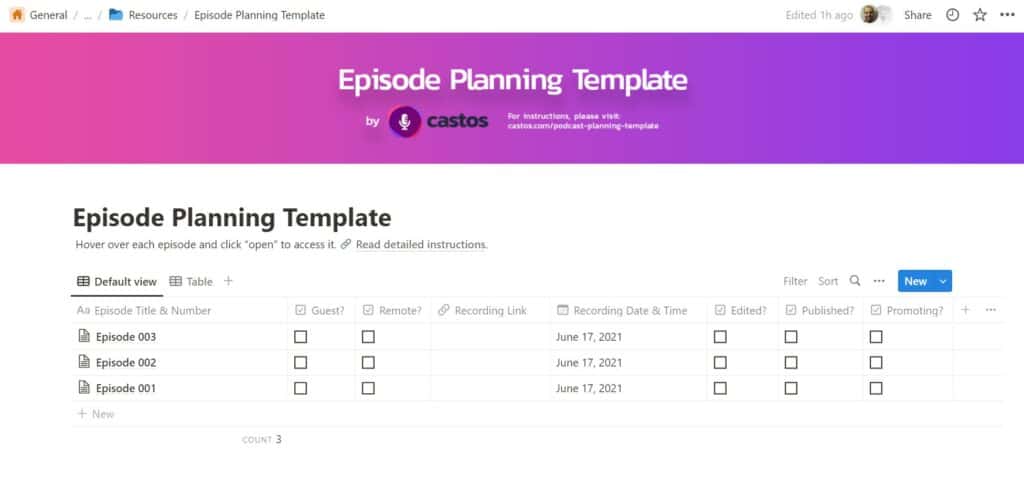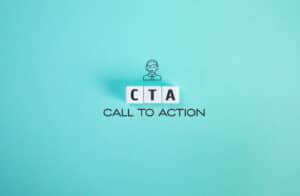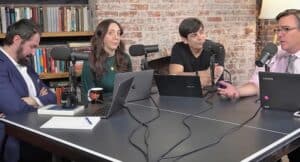Do you find planning your podcast episodes to be challenging? There’s a lot to consider and organize into an engaging piece of the content. The trick is to simplify your work into a repeatable process. This podcast planning template will help!
This podcast planning template is designed to help you put all of your research, notes, and instructions in one centralized place. Use it for yourself and share it with your podcast team so everyone has everything they need to produce a great episode together.
How to Use this Podcast Planning Template
Before we get into the actual template, let’s discuss your options for using it.
Option 1: Duplicate our Notion board
We’ve already built the template for you in our favorite project management platform, Notion. All you have to do is access the Notion board and duplicate it for yourself. Click here to access and duplicate the board.
We recommend this option because it’s super simple and your entire team can access the podcast planning template at any time. Notion is a great place to store collaborative information.
Option 2: Build your own template
If you don’t want to use our podcast planning template, you can always create your own in your favorite project management tool. In fact, you could even do all your planning in a Google Doc. Just make sure you store it somewhere your entire team can access.
Components of a Podcast Planning Template
Now let’s go through each component of the podcast playing template. You’ll notice all of these components in the Notion board we created for you. Here, we’ll explain exactly what to include in each component.
Topic
It’s important that each episode has a clear, easy-to-understand topic. You should be able to explain it in just a few words. Avoid industry jargon unless you’re absolutely sure all of your listeners will understand. If the topic is too complex, consider splitting it into separate episodes.
Most importantly, make sure that your episode topic has a clear connection to the overall topic of your podcast. Don’t host an episode about auto repair in a show about Facebook marketing. If the topic doesn’t relate to the show, your listeners won’t stick around.
Goal
The goal of your episode is what you hope to achieve. This could include a point or argument you intend to make, what you want your audience to learn or know, or an action you want your listeners to take. It’s important to keep this bit of information handy as you record to keep yourself on track.
Here are some examples of episode goals:
- Teach job seekers what employers want out of a cover letter.
- Persuade listeners to adopt gentle parenting over other parenting styles.
- Understand why the food pyramid is inaccurate and outdated.
Research
Whether you’re hosting a monologue episode or interviewing a guest, every episode should include a fair amount of research. As you research, take notes of anything that might be relevant to your show. Include it here so you have all of your information in one place. Don’t be afraid to include images, videos, and links to outside information. You may not use everything, but it’s best to be prepared.
About the guest
Include some basic information about your guest so you have this on hand during your recording.
- Full name and title (in case you forget!)
- Education level and school
- Employer(s) or businesses
- Upcoming books, courses, or projects
- What makes them unique
- Why you invited them on the show
Pre-production call
Most podcasts use a short pre-production call to prepare any guests for the show. This is a great time to make sure their equipment is ready, they understand the audience and the format, and that they’re prepared for some of your most important questions. Yes, you can do a lot of this in an email, but many guests like the high-touch experience of a call.
Use this section to create a checklist of all of the things you want to discuss with a guest during the pre-production call (before the actual interview). If you don’t interview guests, skip this part.
Questions
List all of the pre-prepared questions you have for your guest. Try to be as comprehensive as possible. You don’t have to ask all of them during the interview, but it’s important to have plenty of questions on hand to fill up the episode.
As you record the episode, you will probably think of additional questions. That’s perfectly fine! In fact, it’s an important part of being a good podcast host. But you want enough questions here to get you through the show in case your guest isn’t very talkative.
Talking points
Talking points are broad subjects you intend to hit during the interview. You may not have specific questions or comments regarding these points, but you want them to come up at some time.
For instance, one episode might have a note for “crazy PTO story” to remind you to get the guest to talk about that ridiculous incident with the parent teacher organization.
Notes from the interview
This section is for notes you take during the interview that you’ll consult later. It might include tidbits to help you promote the episode, future episode topics, potential guests to reach out to, or anything else. Jot it down here so you remember it later.
Production notes
Production notes are details you want to leave for the person who produces or edits your show. They give your producers and editors guidance regarding what you expect for the end product.
For instance, you might leave links to the specific background music or sound effects you want to hear. Or you might say, “Play something punchy at 18:40” and give them the authority to choose what sounds right.
Episode outline
Your outline is a breakdown of your show’s actual structure. Understanding this keeps you organized, creates a natural flow, and helps your editors understand what you expect in the final product.
Your outline won’t be the same as other shows, so feel free to be creative. That said, listeners have expectations. If your outline is too unusual, you may struggle to attract new listeners.
Here’s a sample outline from our podcast, Audience. You don’t have to write an outline that matches this format. This is just an example to give you some inspiration.
MONOLOGUE (1-1.5 minutes)
Host VO – Music bed interchangeable from one episode to the next
- Broad theme to focus on
- Snippet from conversation
- “Next, you’ll hear from______. My name is ___ and this is Audience, a Castos Original series. For podcasters in the pursuit of producing better shows and uncovering the business that power audio creators.”
CASTOS PLUG (1 Minute)
Fade music into plug VO for about 10 seconds
- Host read plug for a Castos related service. Copy for ads can be found here [link], though hosts can tweak verbiage from one episode to the next. We will not be using static plugs, each VO needs to be recorded during episode production.
- Stripe Integration
- Castos Academy
- Private podcasting app
- Castos Productions
- 3 Clips plug
EPISODE INTRO (1-2 minutes)
Transition from plug with SFX into music bed
- 15-20 second snippet from conversation
- Host VO introducing guest/podcast, background on the guest/podcast
INTERVIEW (30 minutes)
Transition into a good part of the conversation with a music bed. Ideally this will not be the beginning of the conversation. The first 5 or so minutes of conversations will be recorded to establish rapport, get background information on guests, etc. But those portions should not be included in the final episode.
- Conversation between host and guest
- May include clip(s) from guest’s podcast
- Host tee up for “podcasting tip” segment.
CLOSING CREDITS (1 minute)
- Currently Using Matt’s outro [link here]
- Possibly custom outro reads, TBD
PODCAST TIP
Music bed to play underneath. This can play out the episode for roughly 5-7 seconds after tip.
- Host VO “And now for our podcasting tip”
- Play audio of the guest podcasting tip. Should be recorded during a guest interview.
FINAL CREDITS
Make this Podcast Planning Template Your Own
Every show is different. As a creator, you need the freedom to make your content unique, so don’t feel like you’re stuck with this podcast planning template format. Customize it for your own needs, just make sure there’s a simple, repeatable process for you and your team to follow.



